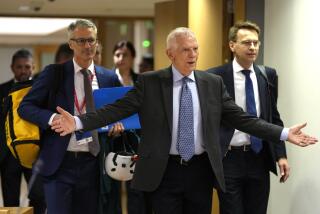IMF Finally Agrees to Give Russia a $1.5-Billion Credit : Aid: The agency had delayed the money since autumn. It will arrive amid disillusion about Western help.
- Share via
MOSCOW — The International Monetary Fund finally agreed Tuesday to deliver a long-awaited $1.5-billion credit meant to further Russian economic reform, Prime Minister Viktor S. Chernomyrdin announced after days of grueling talks here with IMF Director Michel Camdessus.
The IMF’s willingness to deliver the money--after the agency had delayed it since autumn--gave Chernomyrdin a welcome sign of Western belief in his commitment to further Russia’s excruciating reforms.
Chernomyrdin, seen as a tough pragmatist and new believer in tight budgets, told the Interfax news agency that an agreement on the credit will be signed soon. He gave no details.
Ironically, the money came through for Moscow just as policy-makers here have been loudly expressing their disillusionment with Western aid and loans.
The $1.5 billion “has no key significance for us,” former Finance Minister Boris G. Fyodorov said. “We don’t really need the IMF money; no good comes from it, and our debt is growing. If they gave us $15 billion, then it would be possible to do something.”
Moscow’s attitude toward Western aid, always ambivalent, seemingly has cooled considerably in recent months as the Kremlin has sought to espouse a more nationalistic, anti-Western line. And Western lenders have grown even more skeptical of economic prospects here since top reformers Yegor T. Gaidar and Fyodorov left the government in January.
“There have not been such cold relations between Russia and the IMF in the last 2 1/2 years,” Mikhail Berger, an economics columnist for the daily Izvestia, said before the IMF loan agreement was announced.
Russian politicians, already disappointed by spotty delivery of tens of billions of dollars in promised aid, see that “there is more political gain from public statements that Russia should go it on its own rather than depend on foreign aid that isn’t coming anyway,” said Ardy Stoutjesdijk, director of the World Bank office in Russia.
Under Chernomyrdin, Moscow has also shown more reluctance to abide by strings attached to IMF-type credits--among them requirements to lower inflation and keep the budget painfully tight.
Inflation has dropped lately to about 10% a month, but the latest draft budget proposed by Chernomyrdin’s government includes a hideous deficit amounting to one-tenth of the gross national product. And that is at the very least; IMF officials believe that the government has overestimated its income and underestimated its spending.
The $1.5 billion will come in handy. The Russian government had reportedly already figured the IMF credit into its expected budget income.
But the money can barely scratch the surface of Russia’s economic mess. Inflation is expected to shoot upward again in the wake of recently imposed tariff increases on imported goods, including much of the food sold in this nation’s biggest cities. At the same time, industrial production plummeted by 24% in February compared with the same month last year.
Russian officials appreciate aid, but they acknowledge more and more openly that in a country the size of Russia with an economy so deeply in crisis, a billion here and there can no longer do the trick.
“Compare the size of the Russian debt, which is over $70 billion, and this credit of $1.5 billion,” said economist Pyotr S. Filippov, one of Yeltsin’s top advisers. “Furthermore, the volume of Russian money that escapes abroad is 10 times more than the amount of aid we get.
“To receive an extra billion dollars is not a solution to the problem,” he said. “The issue is to make our economy attractive.”
Russian businesses have so little faith in the country’s political and economic future that they tend to siphon their money abroad, depriving Russia of the very investment it needs to fuel reforms and stop the drop in production.
The IMF is under no illusions about the Russian economy. But it is also under heavy pressure from Western leaders to do its part in helping to back Russia’s reforms. It sees support for creation of a stable new Russia as one of its greatest tasks.
Still, the IMF had delayed the $1.5 billion since autumn reportedly because of doubts about Russia’s budget and projected inflation, and talks had deadlocked. Camdessus’ visit here was meant to bring a breakthrough, and it appears to have worked.
More to Read
Sign up for Essential California
The most important California stories and recommendations in your inbox every morning.
You may occasionally receive promotional content from the Los Angeles Times.













